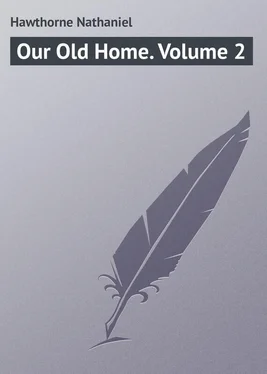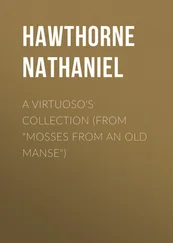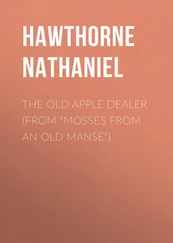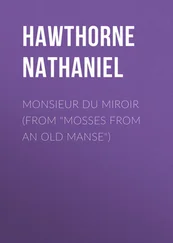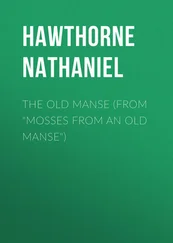Nathaniel Hawthorne - Our Old Home. Volume 2
Здесь есть возможность читать онлайн «Nathaniel Hawthorne - Our Old Home. Volume 2» — ознакомительный отрывок электронной книги совершенно бесплатно, а после прочтения отрывка купить полную версию. В некоторых случаях можно слушать аудио, скачать через торрент в формате fb2 и присутствует краткое содержание. Жанр: foreign_prose, Путешествия и география, foreign_language, на английском языке. Описание произведения, (предисловие) а так же отзывы посетителей доступны на портале библиотеки ЛибКат.
- Название:Our Old Home. Volume 2
- Автор:
- Жанр:
- Год:неизвестен
- ISBN:нет данных
- Рейтинг книги:3 / 5. Голосов: 1
-
Избранное:Добавить в избранное
- Отзывы:
-
Ваша оценка:
- 60
- 1
- 2
- 3
- 4
- 5
Our Old Home. Volume 2: краткое содержание, описание и аннотация
Предлагаем к чтению аннотацию, описание, краткое содержание или предисловие (зависит от того, что написал сам автор книги «Our Old Home. Volume 2»). Если вы не нашли необходимую информацию о книге — напишите в комментариях, мы постараемся отыскать её.
Our Old Home. Volume 2 — читать онлайн ознакомительный отрывок
Ниже представлен текст книги, разбитый по страницам. Система сохранения места последней прочитанной страницы, позволяет с удобством читать онлайн бесплатно книгу «Our Old Home. Volume 2», без необходимости каждый раз заново искать на чём Вы остановились. Поставьте закладку, и сможете в любой момент перейти на страницу, на которой закончили чтение.
Интервал:
Закладка:
At three o'clock or thereabouts (or sooner or later, – for I took little heed of time, and only wished that these delightful wanderings might last forever) we reached Folly Bridge, at Oxford. Here we took possession of a spacious barge, with a house in it, and a comfortable dining-room or drawing-room within the house, and a level roof, on which we could sit at ease, or dance if so inclined. These barges are common at Oxford, – some very splendid ones being owned by the students of the different colleges, or by clubs. They are drawn by horses, like canal-boats; and a horse being attached to our own barge, he trotted off at a reasonable pace, and we slipped through the water behind him, with a gentle and pleasant motion, which, save for the constant vicissitude of cultivated scenery, was like no motion at all. It was life without the trouble of living; nothing was ever more quietly agreeable. In this happy state of mind and body we gazed at Christ Church meadows, as we passed, and at the receding spires and towers of Oxford, and on a good deal of pleasant variety along the banks: young men rowing or fishing; troops of naked boys bathing, as if this were Arcadia, in the simplicity of the Golden Age; country-houses, cottages, water-side inns, all with something fresh about them, as not being sprinkled with the dust of the highway. We were a large party now; for a number of additional guests had joined us at Folly Bridge, and we comprised poets, novelists, scholars, sculptors, painters, architects, men and women of renown, dear friends, genial, outspoken, open-hearted Englishmen, – all voyaging onward together, like the wise ones of Gotham in a bowl. I remember not a single annoyance, except, indeed, that a swarm of wasps came aboard of us and alighted on the head of one of our young gentlemen, attracted by the scent of the pomatum which he had been rubbing into his hair. He was the only victim, and his small trouble the one little flaw in our day's felicity, to put us in mind that we were mortal.
Meanwhile, a table had been laid in the interior of our barge, and spread with cold ham, cold fowl, cold pigeon-pie, cold beef, and other substantial cheer, such as the English love, and Yankees too, – besides tarts, and cakes, and pears, and plums, – not forgetting, of course, a goodly provision of port, sherry, and champagne, and bitter ale, which is like mother's milk to an Englishman, and soon grows equally acceptable to his American cousin. By the time these matters had been properly attended to, we had arrived at that part of the Thames which passes by Nuneham Courtney, a fine estate belonging to the Harcourts, and the present residence of the family. Here we landed, and, climbing a steep slope from the river-side, paused a moment or two to look at an architectural object, called the Carfax, the purport of which I do not well understand. Thence we proceeded onward, through the loveliest park and woodland scenery I ever saw, and under as beautiful a declining sunshine as heaven ever shed over earth, to the stately mansion-house.
As we here cross a private threshold, it is not allowable to pursue my feeble narrative of this delightful day with the same freedom as heretofore; so, perhaps, I may as well bring it to a close. I may mention, however, that I saw the library, a fine, large apartment, hung round with portraits of eminent literary men, principally of the last century, most of whom were familiar guests of the Harcourts. The house itself is about eighty years old, and is built in the classic style, as if the family had been anxious to diverge as far as possible from the Gothic picturesqueness of their old abode at Stanton Harcourt. The grounds were laid out in part by Capability Brown, and seemed to me even more beautiful than those of Blenheim. Mason the poet, a friend of the house, gave the design of a portion of the garden. Of the whole place I will not be niggardly of my rude Transatlantic praise, but be bold to say that it appeared to me as perfect as anything earthly can be, – utterly and entirely finished, as if the years and generations had done all that the hearts and minds of the successive owners could contrive for a spot they dearly loved. Such homes as Nuneham Courtney are among the splendid results of long hereditary possession; and we Republicans, whose households melt away like new-fallen snow in a spring morning, must content ourselves with our many counterbalancing advantages, – for this one, so apparently desirable to the far-projecting selfishness of our nature, we are certain never to attain.
It must not be supposed, nevertheless, that Nuneham Courtney is one of the great show-places of England. It is merely a fair specimen of the better class of country-seats, and has a hundred rivals, and many superiors, in the features of beauty, and expansive, manifold, redundant comfort, which most impressed me. A moderate man might be content with such a home, – that is all.
And now I take leave of Oxford without even an attempt to describe it, – there being no literary faculty, attainable or conceivable by me, which can avail to put it adequately, or even tolerably, upon paper. It must remain its own sole expression; and those whose sad fortune it may be never to behold it have no better resource than to dream about gray, weather-stained, ivy-grown edifices, wrought with quaint Gothic ornament, and standing around grassy quadrangles, where cloistered walks have echoed to the quiet footsteps of twenty generations, – lawns and gardens of luxurious repose, shadowed with canopies of foliage, and lit up with sunny glimpses through archways of great boughs, – spires, towers, and turrets, each with its history and legend, – dimly magnificent chapels, with painted windows of rare beauty and brilliantly diversified hues, creating an atmosphere of richest gloom, – vast college halls, high-windowed, oaken-paneled, and hung round with portraits of the men, in every age, whom the university has nurtured to be illustrious, – long vistas of alcoved libraries, where the wisdom and learned folly of all time is shelved, – kitchens (we throw in this feature by way of ballast, and because it would not be English Oxford without its beef and beer), with huge fireplaces, capable of roasting a hundred joints at once, – and cavernous cellars, where rows of piled-up hogsheads seethe and fume with that mighty malt-liquor which is the true milk of Alma Mater: make all these things vivid in your dream, and you will never know nor believe how inadequate is the result to represent even the merest outside of Oxford.
We feel a genuine reluctance to conclude this article without making our grateful acknowledgments, by name, to a gentleman whose overflowing kindness was the main condition of all our sight-seeings and enjoyments. Delightful as will always be our recollection of Oxford and its neighborhood, we partly suspect that it owes much of its happy coloring to the genial medium through which the objects were presented to us, – to the kindly magic of a hospitality unsurpassed, within our experience, in the quality of making the guest contented with his host, with himself, and everything about him. He has inseparably mingled his image with our remembrance of the Spires of Oxford.
VIII.
SOME OF THE HAUNTS OF BURNS
We left Carlisle at a little past eleven, and within the half hour were at Gretna Green. Thence we rushed onward into Scotland through a flat and dreary tract of country, consisting mainly of desert and bog, where probably the moss-troopers were accustomed to take refuge after their raids into England. Anon, however, the hills hove themselves up to view, occasionally attaining a height which might almost be called mountainous. In about two hours we reached Dumfries, and alighted at the station there.
Chill as the Scottish summer is reputed to be, we found it an awfully hot day, not a whit less so than the day before; but we sturdily adventured through the burning sunshine up into the town, inquiring our way to the residence of Burns. The street leading from the station is called Shakespeare Street; and at its farther extremity we read "Burns Street" on a corner-house, – the avenue thus designated having been formerly known as "Mill-Hole Brae." It is a vile lane, paved with small, hard stones from side to side, and bordered by cottages or mean houses of whitewashed stone, joining one to another along the whole length of the street. With not a tree, of course, or a blade of grass between the paving-stones, the narrow lane was as hot as Tophet, and reeked with a genuine Scotch odor, being infested with unwashed children, and altogether in a state of chronic filth; although some women seemed to be hopelessly scrubbing the thresholds of their wretched dwellings. I never saw an outskirt of a town less fit for a poet's residence, or in which it would be more miserable for any man of cleanly predilections to spend his days.
Читать дальшеИнтервал:
Закладка:
Похожие книги на «Our Old Home. Volume 2»
Представляем Вашему вниманию похожие книги на «Our Old Home. Volume 2» списком для выбора. Мы отобрали схожую по названию и смыслу литературу в надежде предоставить читателям больше вариантов отыскать новые, интересные, ещё непрочитанные произведения.
Обсуждение, отзывы о книге «Our Old Home. Volume 2» и просто собственные мнения читателей. Оставьте ваши комментарии, напишите, что Вы думаете о произведении, его смысле или главных героях. Укажите что конкретно понравилось, а что нет, и почему Вы так считаете.
